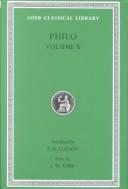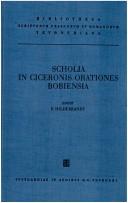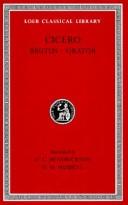| Listing 1 - 8 of 8 |
Sort by
|
Book
ISBN: 0424061805 9780424061801 Year: 1971 Publisher: Sydney: Sydney university press,
Abstract | Keywords | Export | Availability | Bookmark
 Loading...
Loading...Choose an application
- Reference Manager
- EndNote
- RefWorks (Direct export to RefWorks)
Book
Year: 1971 Publisher: Göttingen : Vandenhoeck u. Ruprecht,
Abstract | Keywords | Export | Availability | Bookmark
 Loading...
Loading...Choose an application
- Reference Manager
- EndNote
- RefWorks (Direct export to RefWorks)
Book
Year: 1971 Publisher: Palermo : Palumbo,
Abstract | Keywords | Export | Availability | Bookmark
 Loading...
Loading...Choose an application
- Reference Manager
- EndNote
- RefWorks (Direct export to RefWorks)
Speeches, addresses, etc., Latin --- Rhetoric, Ancient. --- History and criticism. --- Cicero, Marcus Tullius --- Technique.
Book
Year: 1971 Volume: 257 Publisher: Frankfurt am Main : Suhrkamp,
Abstract | Keywords | Export | Availability | Bookmark
 Loading...
Loading...Choose an application
- Reference Manager
- EndNote
- RefWorks (Direct export to RefWorks)
World politics --- Democracy --- Politique mondiale --- Démocratie --- Speeches, addresses, etc. --- Discours

ISBN: 0674994183 9780674994188 0434993808 9780434993802 Year: 1971 Volume: 380 Publisher: Cambridge (Mass.): Harvard university press,
Abstract | Keywords | Export | Availability | Bookmark
 Loading...
Loading...Choose an application
- Reference Manager
- EndNote
- RefWorks (Direct export to RefWorks)
The philosopher Philo was born about 20 BCE to a prominent Jewish family in Alexandria, the chief home of the Jewish Diaspora as well as the chief center of Hellenistic culture; he was trained in Greek as well as Jewish learning. In attempting to reconcile biblical teachings with Greek philosophy he developed ideas that had wide influence on Christian and Jewish religious thought. The Loeb Classical Library edition of the works of Philo is in ten volumes and two supplements, distributed as follows. Volume I: Creation; Interpretation of Genesis II and III. II: On the Cherubim; The Sacrifices of Abel and Cain; The Worse Attacks the Better; The Posterity and Exile of Cain; On the Giants. III: The Unchangeableness of God; On Husbandry; Noah's Work as a Planter; On Drunkenness; On Sobriety. IV: The Confusion of Tongues; The Migration of Abraham; The Heir of Divine Things; On the Preliminary Studies. V: On Flight and Finding; Change of Names; On Dreams. VI: Abraham; Joseph; Moses. VII: The Decalogue; On Special Laws Books I–III. VIII: On Special Laws Book IV; On the Virtues; Rewards and Punishments. IX: Every Good Man Is Free; The Contemplative Life; The Eternity of the World; Against Flaccus; Apology for the Jews; On Providence. X: On the Embassy to Gaius; indexes. Supplement I: Questions on Genesis. II: Questions on Exodus; index to supplements.
Philosophy, Ancient --- Religion --- Greek influences --- Philo, --- Philosophy, Ancient - Greek influences --- Philo, - of Alexandria --- Epic poetry,. --- Speeches, addresses, etc.

ISBN: 3519012383 9783519012382 Year: 1971 Publisher: Stuttgart: Teubner,
Abstract | Keywords | Export | Availability | Bookmark
 Loading...
Loading...Choose an application
- Reference Manager
- EndNote
- RefWorks (Direct export to RefWorks)
Cicero, Marcus Tullius --- Cicero, Marcus Tullius. --- Speeches, addresses, etc., Latin --- History and criticism --- Scholia --- -Latin orations --- Latin speeches --- -T︠S︡it︠s︡eron, Mark Tulliĭ --- Cyceron --- Cicéron --- Kikerōn --- Cicerón, M. Tulio --- Ḳiḳero --- Cicerone --- Cicerón, Marco Tulio --- Ḳiḳero, Marḳus Ṭulyus --- Tullius Cicero, Marcus --- Kikerōn, M. T. --- Cicerone, M. T. --- Cicerone, M. Tullio --- Cicero --- Cicero, M. T. --- Cyceron, Marek Tulliusz --- ציצרון, מארקוס טולליוס --- קיקרו, מארקוס טוליוס --- קיקרו, מרקוס טוליוס --- キケロ --- 西塞罗 --- -History and criticism --- -Scholia --- -Cicero, Marcus Tullius --- Cicéron, Marcus --- -Cicero --- Scholia. --- Speeches, addresses, etc., Latin - History and criticism --- Cicero, Marcus Tullius - Speeches - Scholia --- Cicero, Marcus Tullius - Speeches
Book
ISBN: 0801406455 9780801466335 0801466334 9780801406454 9780801478475 0801466326 0801478472 1322504393 Year: 1971
Abstract | Keywords | Export | Availability | Bookmark
 Loading...
Loading...Choose an application
- Reference Manager
- EndNote
- RefWorks (Direct export to RefWorks)
This is not a book on rhetoric in any narrow sense, but rather concerns its general ambiance and also some of its quite specific manifestations. The thirteen chapters that comprise the book move chronologically from the Renaissance up to the present time. Chapter 2 shows the continuity of verbal expression during the English Renaissance with earlier speech and thought patterns before the invention of writing. In the third chapter, a detailed report is given on the entire production of English-language books on rhetoric and poetic and literary criticism or theory during the Tudor age, from the late 15th through the beginning of the 17th century. The fourth chapter indicates the central significance of the art of memory. The chapters from 5 through 12 treat the interrelationships between social institutions and modes of thought and expression (Latin Language Study as a Renaissance Puberty Rite; Ramist Classroom Procedure and the Nature of Reality; Ramist Method and the Commercial Mind; Swift on the Mind: Satire in a Closed Field; Psyche and the Geometers; Associationist Critical Theory; J. S. Mill's Pariah Poet; Romantic Difference and the Poetics of Technology; and The Literate Orality of Popular Culture Today). The final chapter centers on the history of the humanities to show that they have not been the same in all ages, and that they are always in a state of crisis.
Oratory --- Expression --- Rhetoric --- Languages & Literatures --- Literature - General --- Language and languages --- Speaking --- Authorship --- Literary style --- Expressive behavior --- Eloquence --- Public speaking --- Reading --- Delsarte system --- Elocution --- Nonverbal communication --- Argumentation --- Oratory, Primitive --- Speeches, addresses, etc. --- Debates and debating --- Lectures and lecturing --- Persuasion (Rhetoric) --- Expression. --- Rhetoric. --- LITERARY CRITICISM / Semiotics & Theory.

ISBN: 0434993425 0674993772 9780674993778 9780434993420 Year: 1971 Volume: 342 5 Publisher: London: Heinemann,
Abstract | Keywords | Export | Availability | Bookmark
 Loading...
Loading...Choose an application
- Reference Manager
- EndNote
- RefWorks (Direct export to RefWorks)
We know more of Marcus Tullius Cicero (106-43 BCE), lawyer, orator, politician and philosopher, than of any other Roman. Besides much else, his work conveys the turmoil of his time, and the part he played in a period that saw the rise and fall of Julius Caesar in a tottering republic.
Classical Latin literature --- Oratory, Ancient. --- Languages & Literatures --- Greek & Latin Languages & Literatures --- Rhetoric --- Rhetoric, Ancient --- Intellectual life --- Oratory --- Oratory, Ancient --- Ancient rhetoric --- Classical languages --- Greek language --- Greek rhetoric --- Latin language --- Latin rhetoric --- Language and languages --- Speaking --- Authorship --- Expression --- Literary style --- Argumentation --- Oratory, Primitive --- Speeches, addresses, etc. --- Debates and debating --- Elocution --- Eloquence --- Lectures and lecturing --- Persuasion (Rhetoric) --- Public speaking --- Cultural life --- Culture --- Rome --- Rome (Empire) --- Rim --- Roman Empire --- Roman Republic --- Romi (Empire) --- Byzantine Empire --- Italy --- Roman Republic (510-30 B.C.) --- Rome (Italy)
| Listing 1 - 8 of 8 |
Sort by
|

 Search
Search Feedback
Feedback About UniCat
About UniCat  Help
Help News
News